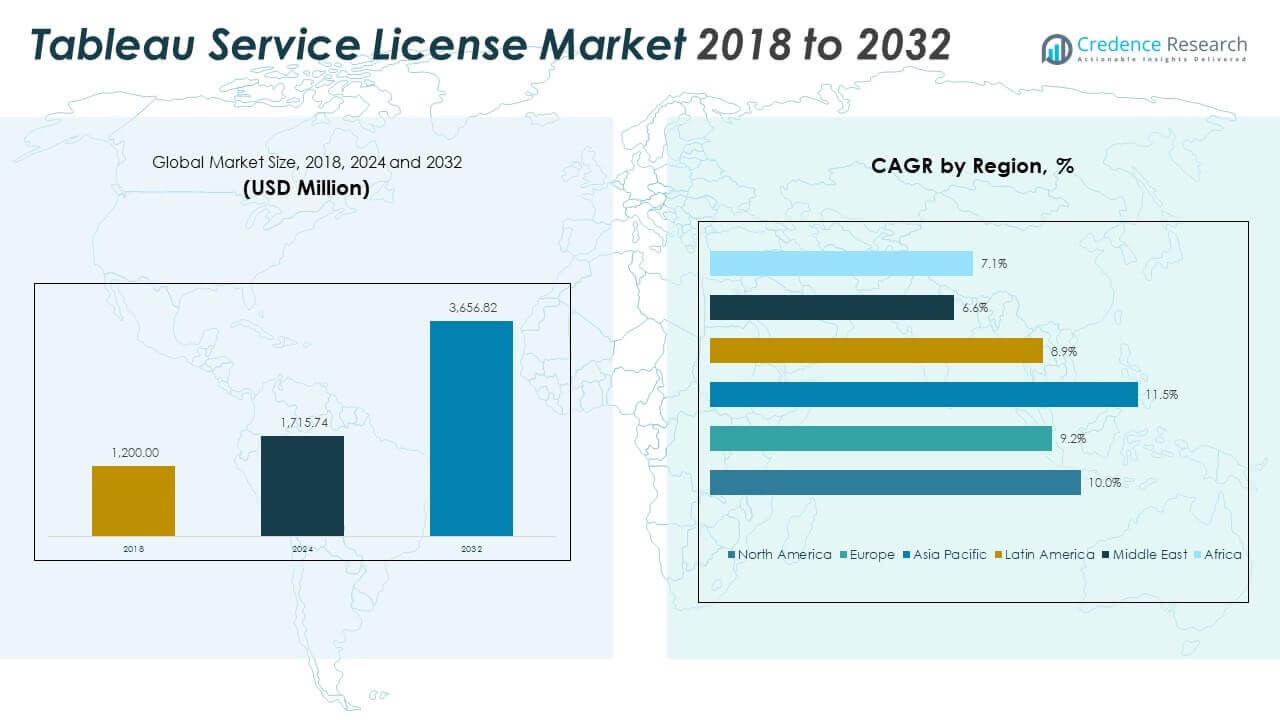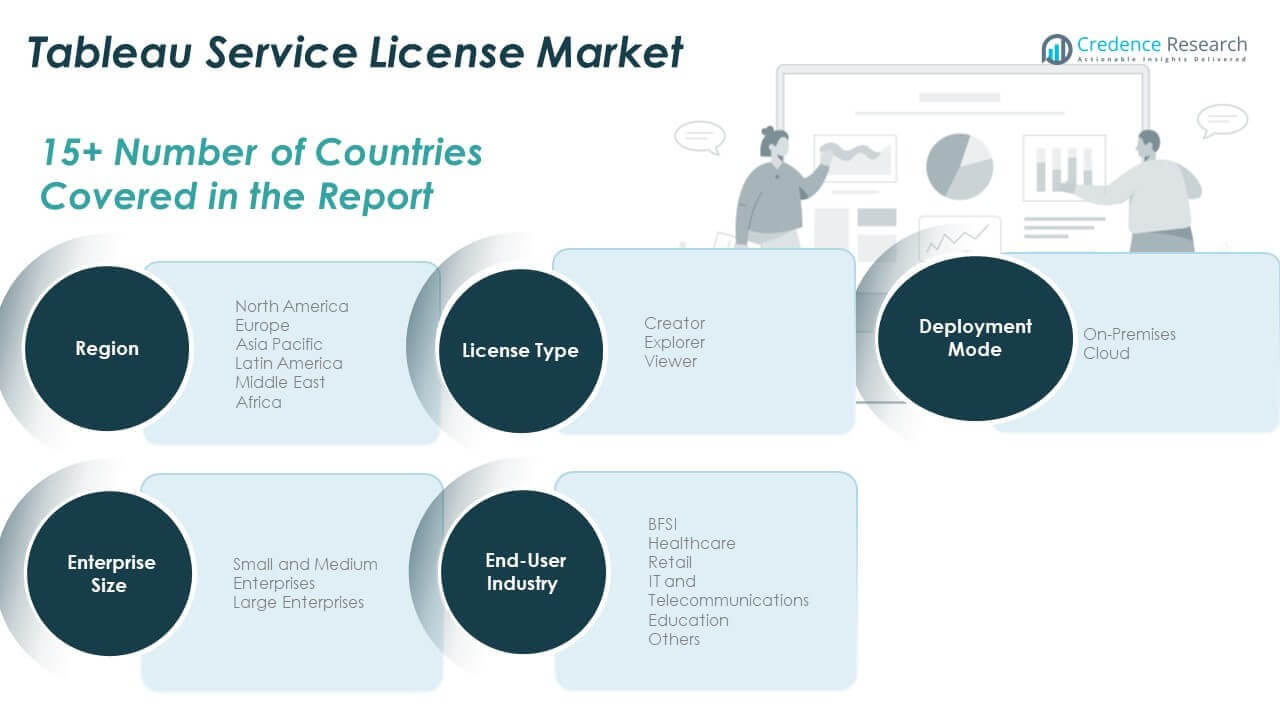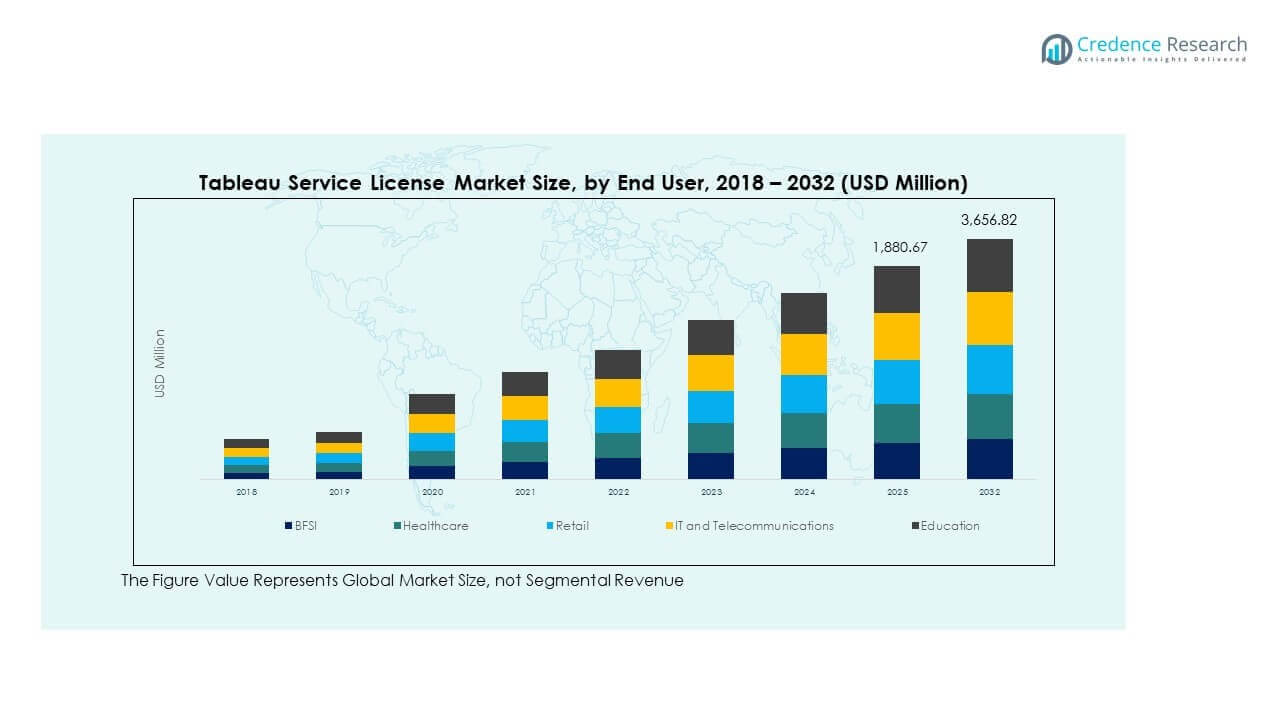Table of Content
CHAPTER NO. 1 : GENESIS OF THE MARKET
1.1 Market Prelude – Introduction & Scope
1.2 The Big Picture – Objectives & Vision
1.3 Strategic Edge – Unique Value Proposition
1.4 Stakeholder Compass – Key Beneficiaries
CHAPTER NO. 2 : EXECUTIVE LENS
2.1 Pulse of the Industry – Market Snapshot
2.2 Growth Arc – Revenue Projections (USD Million)
2.3. Premium Insights – Based on Primary Interviews
CHAPTER NO. 3 : TABLEAU SERVICE LICENSE MARKET FORCES & INDUSTRY PULSE
3.1 Foundations of Change – Market Overview
3.2 Catalysts of Expansion – Key Market Drivers
3.2.1 Momentum Boosters – Growth Triggers
3.2.2 Innovation Fuel – Disruptive Technologies
3.3 Headwinds & Crosswinds – Market Restraints
3.3.1 Regulatory Tides – Compliance Challenges
3.3.2 Economic Frictions – Inflationary Pressures
3.4 Untapped Horizons – Growth Potential & Opportunities
3.5 Strategic Navigation – Industry Frameworks
3.5.1 Market Equilibrium – Porter’s Five Forces
3.5.2 Ecosystem Dynamics – Value Chain Analysis
3.5.3 Macro Forces – PESTEL Breakdown
3.6 Price Trend Analysis
3.6.1 Regional Price Trend
3.6.2 Price Trend by product
CHAPTER NO. 4 : KEY INVESTMENT EPICENTER
4.1 Regional Goldmines – High-Growth Geographies
4.2 Product Frontiers – Lucrative Product Categories
4.3 Deployment Mode Sweet Spots – Emerging Demand Segments
CHAPTER NO. 5: REVENUE TRAJECTORY & WEALTH MAPPING
5.1 Momentum Metrics – Forecast & Growth Curves
5.2 Regional Revenue Footprint – Market Share Insights
5.3 Segmental Wealth Flow – License Type & Deployment Mode Revenue
CHAPTER NO. 6 : TRADE & COMMERCE ANALYSIS
6.1. Import Analysis by Region
6.1.1. Global Tableau Service License Market Import Revenue By Region
6.2. Export Analysis by Region
6.2.1. Global Tableau Service License Market Export Revenue By Region
CHAPTER NO. 7 : COMPETITION ANALYSIS
7.1. Company Market Share Analysis
7.1.1. Global Tableau Service License Market: Company Market Share
7.2. Global Tableau Service License Market Company Revenue Market Share
7.3. Strategic Developments
7.3.1. Acquisitions & Mergers
7.3.2. New Product Launch
7.3.3. Regional Expansion
7.4. Competitive Dashboard
7.5. Company Assessment Metrics, 2024
CHAPTER NO. 8 : TABLEAU SERVICE LICENSE MARKET – BY LICENSE TYPE SEGMENT ANALYSIS
8.1. Tableau Service License Market Overview by License Type Segment
8.1.1. Tableau Service License Market Revenue Share By License Type
8.2. Creator
8.3. Explorer
8.4. Viewer
CHAPTER NO. 9 : TABLEAU SERVICE LICENSE MARKET – BY DEPLOYMENT MODE SEGMENT ANALYSIS
9.1. Tableau Service License Market Overview by Deployment Mode Segment
9.1.1. Tableau Service License Market Revenue Share By Deployment Mode
9.2. On-Premises
9.3. Cloud
CHAPTER NO. 10 : TABLEAU SERVICE LICENSE MARKET – BY END-USER INDUSTRY SEGMENT ANALYSIS
10.1. Tableau Service License Market Overview by End-user Industry Segment
10.1.1. Tableau Service License Market Revenue Share By End-user Industry
10.2. BFSI
10.3. Healthcare
10.4. Retail
10.5. IT and Telecommunications
10.6. Education
10.7. Others
CHAPTER NO. 11 : TABLEAU SERVICE LICENSE MARKET – BY DEPLOYMENT MODE SEGMENT ANALYSIS
11.1. Tableau Service License Market Overview by Deployment Mode Segment
11.1.1. Tableau Service License Market Revenue Share By Deployment Mode
11.2. On-Premises
11.3. Cloud
CHAPTER NO. 12 : TABLEAU SERVICE LICENSE MARKET – REGIONAL ANALYSIS
12.1. Tableau Service License Market Overview by Region Segment
12.1.1. Global Tableau Service License Market Revenue Share By Region
12.1.2. Regions
12.1.3. Global Tableau Service License Market Revenue By Region
12.1.4. License Type
12.1.5. Global Tableau Service License Market Revenue By License Type
12.1.6. Deployment Mode
12.1.7. Global Tableau Service License Market Revenue By Deployment Mode
12.1.8. End-user Industry
12.1.9. Global Tableau Service License Market Revenue By End-user Industry
12.1.10. Deployment Mode
12.1.11. Global Tableau Service License Market Revenue By Deployment Mode
CHAPTER NO. 13 : NORTH AMERICA TABLEAU SERVICE LICENSE MARKET – COUNTRY ANALYSIS
13.1. North America Tableau Service License Market Overview by Country Segment
13.1.1. North America Tableau Service License Market Revenue Share By Region
13.2. North America
13.2.1. North America Tableau Service License Market Revenue By Country
13.2.2. License Type
13.2.3. North America Tableau Service License Market Revenue By License Type
13.2.4. Deployment Mode
13.2.5. North America Tableau Service License Market Revenue By Deployment Mode
13.2.6. End-user Industry
13.2.7. North America Tableau Service License Market Revenue By End-user Industry
13.2.8. Deployment Mode
13.2.9. North America Tableau Service License Market Revenue By Deployment Mode
13.3. U.S.
13.4. Canada
13.5. Mexico
CHAPTER NO. 14 : EUROPE TABLEAU SERVICE LICENSE MARKET – COUNTRY ANALYSIS
14.1. Europe Tableau Service License Market Overview by Country Segment
14.1.1. Europe Tableau Service License Market Revenue Share By Region
14.2. Europe
14.2.1. Europe Tableau Service License Market Revenue By Country
14.2.2. License Type
14.2.3. Europe Tableau Service License Market Revenue By License Type
14.2.4. Deployment Mode
14.2.5. Europe Tableau Service License Market Revenue By Deployment Mode
14.2.6. End-user Industry
14.2.7. Europe Tableau Service License Market Revenue By End-user Industry
14.2.8. Deployment Mode
14.2.9. Europe Tableau Service License Market Revenue By Deployment Mode
14.3. UK
14.4. France
14.5. Germany
14.6. Italy
14.7. Spain
14.8. Russia
14.9. Rest of Europe
CHAPTER NO. 15 : ASIA PACIFIC TABLEAU SERVICE LICENSE MARKET – COUNTRY ANALYSIS
15.1. Asia Pacific Tableau Service License Market Overview by Country Segment
15.1.1. Asia Pacific Tableau Service License Market Revenue Share By Region
15.2. Asia Pacific
15.2.1. Asia Pacific Tableau Service License Market Revenue By Country
15.2.2. License Type
15.2.3. Asia Pacific Tableau Service License Market Revenue By License Type
15.2.4. Deployment Mode
15.2.5. Asia Pacific Tableau Service License Market Revenue By Deployment Mode
15.2.6. End-user Industry
15.2.7. Asia Pacific Tableau Service License Market Revenue By End-user Industry
15.2.8. Deployment Mode
15.2.9. Asia Pacific Tableau Service License Market Revenue By Deployment Mode
15.3. China
15.4. Japan
15.5. South Korea
15.6. India
15.7. Australia
15.8. Southeast Asia
15.9. Rest of Asia Pacific
CHAPTER NO. 16 : LATIN AMERICA TABLEAU SERVICE LICENSE MARKET – COUNTRY ANALYSIS
16.1. Latin America Tableau Service License Market Overview by Country Segment
16.1.1. Latin America Tableau Service License Market Revenue Share By Region
16.2. Latin America
16.2.1. Latin America Tableau Service License Market Revenue By Country
16.2.2. License Type
16.2.3. Latin America Tableau Service License Market Revenue By License Type
16.2.4. Deployment Mode
16.2.5. Latin America Tableau Service License Market Revenue By Deployment Mode
16.2.6. End-user Industry
16.2.7. Latin America Tableau Service License Market Revenue By End-user Industry
16.2.8. Deployment Mode
16.2.9. Latin America Tableau Service License Market Revenue By Deployment Mode
16.3. Brazil
16.4. Argentina
16.5. Rest of Latin America
CHAPTER NO. 17 : MIDDLE EAST TABLEAU SERVICE LICENSE MARKET – COUNTRY ANALYSIS
17.1. Middle East Tableau Service License Market Overview by Country Segment
17.1.1. Middle East Tableau Service License Market Revenue Share By Region
17.2. Middle East
17.2.1. Middle East Tableau Service License Market Revenue By Country
17.2.2. License Type
17.2.3. Middle East Tableau Service License Market Revenue By License Type
17.2.4. Deployment Mode
17.2.5. Middle East Tableau Service License Market Revenue By Deployment Mode
17.2.6. End-user Industry
17.2.7. Middle East Tableau Service License Market Revenue By End-user Industry
17.2.8. Deployment Mode
17.2.9. Middle East Tableau Service License Market Revenue By Deployment Mode
17.3. GCC Countries
17.4. Israel
17.5. Turkey
17.6. Rest of Middle East
CHAPTER NO. 18 : AFRICA TABLEAU SERVICE LICENSE MARKET – COUNTRY ANALYSIS
18.1. Africa Tableau Service License Market Overview by Country Segment
18.1.1. Africa Tableau Service License Market Revenue Share By Region
18.2. Africa
18.2.1. Africa Tableau Service License Market Revenue By Country
18.2.2. License Type
18.2.3. Africa Tableau Service License Market Revenue By License Type
18.2.4. Deployment Mode
18.2.5. Africa Tableau Service License Market Revenue By Deployment Mode
18.2.6. End-user Industry
18.2.7. Africa Tableau Service License Market Revenue By End-user Industry
18.2.8. Deployment Mode
18.2.9. Africa Tableau Service License Market Revenue By Deployment Mode
18.3. South Africa
18.4. Egypt
18.5. Rest of Africa
CHAPTER NO. 19 : COMPANY PROFILES
19.1. Salesforce, Inc.
19.1.1. Company Overview
19.1.2. Product Portfolio
19.1.3. Financial Overview
19.1.4. Recent Developments
19.1.5. Growth Strategy
19.1.6. SWOT Analysis
19.2. Microsoft Corporation
19.3. IBM Corporation
19.4. Oracle Corporation
19.5. SAP SE
19.6. Amazon Web Services, Inc.
19.7. QlikTech International AB
19.8. TIBCO Software Inc.
19.9. Sisense Inc.
19.10. MicroStrategy Incorporated
19.11. Domo, Inc.
19.12. Looker Data Sciences, Inc.
19.13. Alteryx, Inc.
19.14. SAS Institute Inc.
19.15. Zoho Corporation Pvt. Ltd.
19.16. Infor, Inc.
19.17. Yellowfin International Pty Ltd
19.18. GoodData Corporation
19.19. Board International S.A.
19.20. Birst, Inc.






